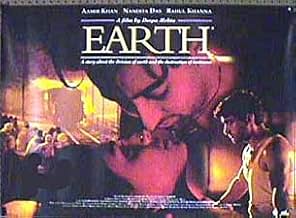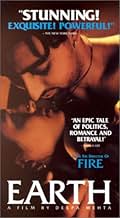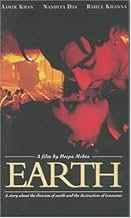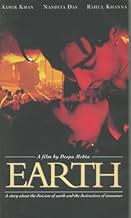Nel 1947, durante la Partizione dell'India, una bambina vede la sua tata divisa tra due amanti mentre il conflitto religioso travolge le loro vite.Nel 1947, durante la Partizione dell'India, una bambina vede la sua tata divisa tra due amanti mentre il conflitto religioso travolge le loro vite.Nel 1947, durante la Partizione dell'India, una bambina vede la sua tata divisa tra due amanti mentre il conflitto religioso travolge le loro vite.
- Regia
- Sceneggiatura
- Star
- Premi
- 3 vittorie e 2 candidature totali
- Hariya
- (as Raghuvir Yadav)
- …
- Butcher
- (as Pavan Malhotra)
Recensioni in evidenza
For me this movie is not about partition,but about human nature.The veil that separates us from animals becomes an anomaly in certain situation.So it is not so much the partition that drew the worst out of the characters but the demons such as lust,violence,jealousy,anger,resentment that already exist at the very core of human nature.It may or may not manifest itself in its most carnal form.But in this case it does.
The innovation of songs as a part of narration was a masterstroke and when you have A R Rehamn at the fore,there will be magic."Raat Ki Dal Dal" is probably one of the most wonderfully pictured songs I have have seen in recent times,as the camera zooms in on Aamir as he is waiting for the train from India,encapsulating his anxiety.The art work is accurate enough,the cinematography is excellent(notice how the camera-work changes from being still and peaceful in first half to more vibrant in the second half).
The performances of the entire cast is brilliant,whether it is the parsi family or Dil Nawaz's friend circle or even Gulshan Grover for that matter.Everyone seems to be on the money.Rahul khanna is a natural talent like his brother(which explains why he is not making it big in this superficial industry),he is rightly understated through the film.His is the only character which doesn't have as many demons and is probably at peace with himself after having the women of his dreams.Nandita Das is a brilliant actress whom I have long admired along with Seema Biswas and Konkana Sen.Her courage and talent shines through as she plays a character who is oozing sexuality,is flirtatious and maybe some what naive.
In case of great actors,I try not to use the "best" and "greatest" to describe their performances,because it in a way diminishes their remaining equally brilliant body of work.But this was a new high for Aamir khan in my book.Before this movie I thought he was one of the most talented,versatile and courageous actors within the industry.This film is where he transcended to greatness and stayed there.To be very honest,most of the ground work was laid in the novel for this role,but one needs great vision to convey this charming character's journey into madness.The use of body language and "silence" is what separates the great actors from others.Al Pacino,George C Scott,De Niro,Sanjeev Kumar understood the value of it and here Aamir showcases his class especially in the climax.
This film is not for the faint hearted.But that is what I have admired Deepa Mehta for.She has always been ruthlessly truthful when it comes to human nature whether it is "earth" or "fire".Unfortunately most of the Indians like the "escapist" mode just to "make them feel good about themselves".If you are one of those this not for you.
P.S.Majority of the reviews here are spot on and people not aware of the horrors of partition were also able to connect on a human level which fulfills the purpose of this film.
Most of the comments here on IMDb are positive and I agree with these reviews. However, for me the cynicism of the critics was unfounded because I was not expecting the usual Hollywood movie. If you cannot relate to this film in a positive way then I suppose that you have not traveled much and have not lived in other cultures, at least not in Asia. This is not an American film made for an American audience.
This is very much an adult film for a sensitive and mature audience. It is certainly not for those seeking the usual thrills and spills and formula love stories. We are given a look at a very important and prominent country being split up by a colonial power, and how this political decision affects millions of people in some of the most awful manners. A million lost their lives! The tension between India and Pakistan still haunts us all ! So don't expect a nice and sweet film, although there were some beautiful scenes of childhood innocence and the romance of young lovers.
The symbolism is rich. At the start we see a dinner table with the main groups of people represented in the formation of Pakistan: English, Sikh, Muslim, Hindu, Parsee. Throughout the film Lenny Baby represents the innocence and naivety which so many people remain in during geopolitical processes. When it is this young girl's birthday, she can find no one who cares. Her birthday is the same day of the Pakistan-India split, and the symbolism is obvious. She then finds a Muslim refugee boy whose mother was brutally killed by Hindus. He asks her if she is a Hindu and when she replies "no" she also asks if he wants some cake. "Cake? What is cake?" Lenny-the-Naive is baffled, and again the symbolism is obvious. So many of us cannot really relate to the plight of refugees. What happens to this innocent and naive position at the end? We are stunned to see the results. Naivety leads Beauty and Love to a terrible fate. Innocence is tragically deceived. It wasn't until my second viewing of this film that I saw the many symbolic references. Watch the film with this perspective and you will see through the cynicism such as writer "Pass the pappadom" makes elsewhere on this page.
One symbolic reference that I am not sure if I understand was that of the Sikh man and his family, hiding from the Muslim killer mob. He was such a sincere and gentle man, and even his dagger raised in defense did not detract from his positive qualities. Was he portrayed in this way because the Sikhs had too much 'bad press' about their warrior ways? Were the Sikhs ineffective in protecting themselves during the division?
A friend of mine told me that he cried all the way home after seeing this film. He is 46 years old and not a weak and overly sensitive person. My wife and I were quite emotionally moved by this film, and we cannot relate to the film critics that say otherwise. By the way, my wife lived in India for a year and she loved seeing the various scenes of everyday Indian life, so you may enjoy the film just for the sake of seeing people living life outside of Hollywood America.
One last symbolic reference to ponder was the touching romantic scene between the two lovers amidst the ancient ruins. Here we see a Muslim man saying that he would convert to Hinduism so that the marriage would be possible. All they needed to do is to leave to live in the newly divided India. The ancient ruins indicate the past, but unfortunately the lovers return to the present.
This is a film that I will remember for a long time. I highly recommend that you see it, if you don't mind a serious film about major issues, seen from a non-American perspective.
Director - writer Deepa Mehta deserves much credit for depicting the complexities of one of the world's worst tragedies with diplomatic balance, not placing blame on any one group but yet revealing the errors and brutality that each group made.
If the film is conventional is outline, it is also intelligent, beautiful and economical in a way most stodgy historical epics are not. Its predominantly Western structure is filtered through with a restrained Bollywood sensuality, and, in the first half especially, after one has gotten used to the rather stilted dialogue and stylised situations, one is astounded by the caressing fluidity of the camerawork; the uncommon beauty of compositions, especially indoors, where the essentially muted 'earth' colours of the decor are pierced by unearthly shards of light; the profusion of dazzling colours, in costumes, and especially in the horrific marriage sequence, undermining the strained sobriety of most historical epics; the unforced breaks into song and dance, the accumulation of vignettes, some comic, some full of joy and promise, some bursting with foreboding, that give a sense of life being lived, a life already fragile in status, waiting to be destroyed; the unabashed use of melodrama, its critical framing device (in one horrible scene, the protagonists watch helplessly from a balcony the strangely beautiful conflict, passive like us the audience), and its emotional demands on the audience I realise that much of my pleasure comes from a racist 'Orientalism', a projection of my desires of exoticism and Otherness on the East, but my own country has a traumatic history of British Imperialism and partitions, so I don't feel too guilty.
The first half is as good as anything in cinema this year, once one has got used to the shifts in register. It is full of the autumnal sadness of a Chekhov play, or Ray's CHARULATA, or LE REGLE DU JEU, where we observe people living life, being friends, making love playing games, while we know history is sadistically poised on the brink, waiting to crush everything. Mehta never falls into nostalgia for this doomed idyll - she records the legacy of the British Empire; the horrors of the caste system; the emotional repression, the arranged marriages between senile paedophiles and pre-pubescent girls. But this section is also full of epiphany, the thrill of the sexual chase, friendship, poetry and, above all, comedy, all the things about to be distorted and destroyed by history as it performs a body snatching operation onto people we have come to love and turns them into vicious murderers.
The second half is an unrelenting catalogue of jolting spasms of violence. Day gives way to night, earthy browns and sun to blackness, friendship and love to death and hate. The film is also a bildungsroman, the tale of the development of a young girl as she learns about life, love, family, gender, language, society, history, culture, politics a development cruelly cut short, distorted, vandalised - when we see the charming dew-eyed narrator half a century later, emotionally in ruins as she stands self-effacingly in the ruins of Imperial pomp (an amazing shot, the film's sparing use of ruined architecture gives the film on occasion a ghostly feel), we sense irreperable loss.
The film has at its heart the year 1947 when India was given its independence from Great Britain and at the same time bifurcated into two countries - India and Pakistan. The story opens with a tranquil park picnic in Lahore where friends - Hindu, Muslim, Sikh, Parsee - while away the afternoon in camaraderie. Only slight overtones of edgy topics about religion mar the conversation until the topic focuses on the incipient split of the country into two countries. Each of the friends represents each of the religious sects and it is how these differences, at once unimportant to friendship, end up in separating the friends under the influence of the devastation of bloodshed that follows the division of the country and the displacement of millions of people, all under the guise of independence.
There is a strong love story, a committed crippled child who experiences all of the happiness and subsequent tragedy that is to follow and the story ends with some words of wisdom by the grown little girl reflecting on choices made, and other sidebars that maintain interest at every frame.
The acting is first rate from a beautiful cast and Mehta's direction makes this tale of change whir by the viewer. For those not educated in the differences of the four religious sects of Hindu, Parsee, Muslim, and Sikh the tale can become confusing: would that Mehta would have included a discussion about the film in an added feature the way she helped us understand the plight of widows in WATER. And the subtitles unfortunately do not translate the English spoken portions of the film, portions that while very important to the story are nearly indecipherable due to the accents of the characters speaking.
But these are minor quibbles in a film that pleads for repeated viewings, so beautiful is the movie and so very important is the message. Highly Recommended.
As Parsees, India's "invisible" people, Lenny's wealthy family is supposedly sheltered from the growing conflict by an ever-fragile 'neutrality'. Lenny's naïvety is used quite effectively to endear her to the viewer. Her innocence makes the tragedy of Partition even more profound. The events occurring are incomprehensible to Lenny; her naïvety is best illustrated in the opening scene, in which she breaks a plate and, utterly perplexed, enquires "Can one break a country?" The story, though narrated by Lenny at beginning and end, does not always seem to be from her viewpoint and one doubts if she could accurately be described as the protagonist.
Lenny's Hindu ayah, or nanny, appears to be more of a focus. Shanta (Nandita Das) is beautiful, and is surrounded by a circle of male admirers, and, in particular, two Muslims suitors who vie for her affection. One is the poetic Dil Navaz (Aamir Khan), or as Lenny calls him, Ice Candy Man, and the other is a masseuse, Hassan (Rahul Khanna). Although it initially seems that it is with Dil Navaz that her affections lie, Hassan proves to be her true love, much to the surprise of the viewer. Whilst it is never really shown why Dil Navaz's courtship fails, the viewer could infer that it he lacked a certain gentlemanliness and that he possessed a certain darkness. What is clear is the love that Hassan has for Shanta; a love that is realised in a beautifully handled love-scene. Shanta is a woman for which he would convert to Hinduism and risk his life.
Mehta does not shy away from depicting the savagery of the conflict and the film possesses some extremely powerful moments. One in particular is the debilitating and horrifically gruesome 'de-limbing' of a man caught in the fury of a mob. Another, arguably most powerful, scene is the discovery of a trainload of massacre victims by Dil Navaz, among them his sisters, and sacks of severed breasts. The climax of the movie is a devastating illustration of the consequences of unrequited love. In the scene, we see the supposed protection of the Parsees crumble as an enraged Muslim mob arrives seeking Hindus and Sikhs. Shanta, a Hindu, is hidden in the house, as the mob questions workers who have converted from Hindu and Sikh to Muslim and Christian and then demands Shanta. Dil Navaz, played deftly by Aamir Khan, appears from the crowd, and appearing a "hero", deceives Lenny into revealing Shanta's whereabouts who is then dragged away screaming, and presumably murdered.
Based on the novel "Cracking India", by Bapsi Sidhwa (who co-adapted the script), the film translate to screen in a rich, flowing melodrama. It is strong in symbolism and the obvious motif of 'breaking' (plates, persons, dolls and relationships) works to keep the Partition in frame-of-mind. Mehta has created a sensual piece of dazzling colours that correspond with the moment in time in the first half it is joyful and organic, in the second it is dark and ominous. The accompanying soundtrack, by A.R. Rahman, is effective and appropriate. However, the film sits awkwardly betwixt the style of 'Bollywood' and that of Hollywood. It has, one could argue, obviously been made with a Western audience in mind, and consequently, does not set to be historically informative. Nevertheless, it is an effective piece that does not befuddle the viewer, and provides insight into how people were directly affected by the Partition, an event that still reverberates today.
(S. R. Watson, Flinders University, Adelaide)
Lo sapevi?
- QuizAamir Khan's first negative role. He went on to receive much critical acclaim for his performance.
- Citazioni
Older Lenny: I was eight years old, living in Lahore in March of 1947, when the British Empire in lndia started to collapse. Along with talks of lndia's independence from Britain came rumblings about its division into two countries, Pakistan and lndia. Hindus, Muslims, and Sikhs who had lived together as one entity for centuries. suddenly started to clamor for pieces of lndia for themselves. The arbitrary line of division the British would draw to carve up lndia in August of 1947 would scar the Subcontinent forever.
- ConnessioniFeatured in Women Make Film: A New Road Movie Through Cinema (2018)
I più visti
- How long is Earth?Powered by Alexa
Dettagli
Botteghino
- Lordo Stati Uniti e Canada
- 424.798 USD
- Fine settimana di apertura Stati Uniti e Canada
- 42.449 USD
- 12 set 1999
- Lordo in tutto il mondo
- 424.798 USD
Contribuisci a questa pagina



































